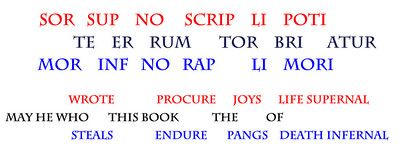From the probably-more-effective dept
Slashdot points us to this wonderful blog post on the Got Medieval blog about how monks and scribes in the middle ages "copy protected" their books with "book curses" inscribed within the book.
I almost wonder if those were more effective than today's DRM attempts.
The blog has a nice image of one such curse, but here are a couple that I find amusing:
Should anyone by craft of any device whatever abstract this book from this place may his soul suffer, in retribution for what he has done, and may his name be erased from the book of the living and not recorded among the Blessed.Perhaps the most clever one though, is described as follows:
--attributed to a 16th-century French missal belonging to a man named Robert
Thys boke is one
And Godes kors ys anoder;
They take the ton,
God gefe them the toder.
[This book is one (thing),
And God's curse is another;
They that take the one,
God gives them the other.]
--found in various Middle English books.But far and away my favorite curse is found in a collection of English court transcripts made by William Easingwold around 1491. It takes the form of a clever Latin code. If you read the top two lines together it says "May he who wrote this book procure the joys of life supernal", but the bottom two together produce "May he who steals this book endure the pangs of death infernal" (Drogin's translation). I don't have an image of the manuscript, but this is a close approximation:All of this reminds me of an even older story of books and attempts to stop copying, which we wrote about last year, concerning Saint Columba -- also known as Colmcille or Colum Cille -- who in the 6th century, decided to copy some religious books in an attempt to "share" the faith with others. He did so with a Latin translation of the Bible and it created quite the mess, with a debate over the legality of copying a book, and whether or not it counted as "property." You see, these arguments aren't particularly new...
Wednesday, September 8, 2010
"Medieval Copy Protection: I Put A Curse On You"
Via techdirt: